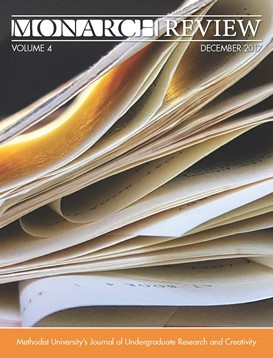Monarch Review, Vol. 4 (2017)
Dear Reader,
 In this fourth volume of the Monarch Review, we feature the work of more undergraduate students and more disciplines than ever—evidence that the journal continues to grow and become better known across the campus of Methodist University.
In this fourth volume of the Monarch Review, we feature the work of more undergraduate students and more disciplines than ever—evidence that the journal continues to grow and become better known across the campus of Methodist University.
In fact, the journal has negotiated two perilous transitions to produce the current volume: In academic year 2016-2017, for the first time the journal lacked its founding senior student editor Miranda Friel. Cheri Molter stepped up and ably led the student staff who did the lion’s work (last spring) of selecting and overseeing author revisions to the largest, most complex set of undergraduate research papers the journal has ever received. Also for the first time, we faced a complete turnover in student staff this past fall. The loss of experience and skill could have been disastrous; instead, the student staff now consists of nine smart, engaged undergrads who have taken to their responsibilities with enthusiasm and diligence. They are also the most diverse staff we’ve had and include freshmen and upperclassmen/women who represent a broad array of nationalities, ethnicities, and academic majors.
The papers published in this volume reflect the current preoccupations of the population at large: gender variability, gender oppression, conspicuous consumption, forms of religious life, public education of our children, environmental pressures, crime, health, and poverty. Essays range from a straightforward and thoughtful treatment of the father’s role in breastfeeding to a complex analysis, via mathematical calculations and computer modelling, of ways to synthesize the therapeutic component of the ginger root. We present trenchant cultural criticism—Black Friday’s consumption furor, the de-valuing of public school teachers, Mexican village women pressing for equality—and highly technical analysis—forensic experiments, diagnosis of skin diseases of tropical sloths, and pharmaceutical chemistry. The nutritional needs of diabetics, indicators of poverty in the US, Franz Schubert’s musical composition strategies, and a persuasive argument that Ernest Hemingway, that icon of masculinity, actually held a nuanced understanding of gender possibilities—who knew!—round out the papers in this volume.
The art work is similarly varied. The visual art includes marvelous charcoal drawings, several striking photograph, and provocative digitally created images. We present a flute performance and, in a real first, a traditional Indian dance performance. Contributing artist Tracey Raupp deserves a special shout-out: This amateur photographer has submitted dozens of photographs for each of the first four volumes of the Monarch Review, and every year we have published some of her images. But this year we’ve also used one of her photos, for the first time, on the cover of the journal.
Amateur artists, take note! You too can submit your work to the Monarch Review. At the very least, you’ll receive some thoughtful and expert feedback. And you may get published and even make the cover.
Later this year, we will regretfully say good-bye to President Ben Hancock. If not for his support, this journal would not exist. The continuing presence of this platform for our undergraduates’ work represents part of his legacy at Methodist University. Others—notably Provost Delmas Crisp, program directors Dr. Clay Britton (CRC) and Prof. Robin Greene (Writing Center), Miranda Friel, and Dr. Kelly Walter Carney—were also vital, early proponents of the Monarch Review. We hope they are pleased with the results of their vision. And we hope every member of the Methodist community is proud of this journal and the outstanding work of the undergraduate students of Methodist University.
May you enjoy volume four.
Best regards,
Baylor Hicks
Managing Editor
Peer-Reviewed Research
The Gender Continuum in Ernest Hemingway’s War Novels (American literature)
Nina Derek
A Gender-bound Domain in Teotitlán del Valle: The Evolving Roles of Zapotec Women (women’s studies)
Cheri Molter
The Cult of Consumer Capitalism and Black Friday, or the Evening Greenness in the West (religion)
Christopher Miller
The Debate on the Necessity of Church Buildings Through the Lens of the Wesleyan Quadrilateral (religion)
Matthew J. French
Death, the Trout, and the Maiden: Schubert’s Instrumental Interpretation of His Lieder (music history)
Katlin Harris
Teaching: The Job That Anyone Can Do? (education)
Emily Ewin
Ectoparasitic Skin Diseases of Two-toed and Three-toed Sloths in Costa Rica (biology)
Stephanie Dewell
A Comparative Analysis for the Identification of Gunshot Residues in Burnt, Decomposed Tissue and Cremated Bone Samples (forensic chemistry)
Christopher West
A Computational Study for Optimizing a Synthetic Pathway to a Difluorinated Gingerol Compound (chemistry)
Christopher West
Glucophage® (Metformin Hydrochloride), the Wonder Drug: A Biguanide Class Treatment of Type 2 Diabetes (chemistry)
Gabrielle Wentling
Nutritional Requirements and Nursing Care Management for Diabetes Mellitus (nursing)
Courtney DeGarmo
Engaging and Supporting Fathers with Breastfeeding Partners (nursing)
Amber LeRoy
Analysis of Factors Contributing to Poverty in the United States: An Empirical Study (political science)
Chioma Austin-Mona Azih
Performing Arts
Dance, “Pinga”—Artist’s Statement
Dipali Tikone, Pooja Nikalje, Vrushali Thombare, Jyoti Ghule
Juried Artwork
Artists’ Statements—Stacey Marie Summers and Walter Barnett
Artist’s Statements—Tracey Raupp
 |
 |
| Cthulu Stacey Marie Summers |
World Crisis, 1.2 Walter Barnett |
|
|
|
 |
 |
| Self-portrait (Ball Is Life) Walter Barnett |
King Kong Movie Poster Walter Barnett |
|
|
|
 |
 |
| Octophant Walter Barnett |
Immeasurable Gold Tracey Raupp |
|
|
|
 |
 |
| Content Cohesion Tracey Raupp |
Change of Movement Tracey Raupp |
|
|
|
 |
 |
| Immediacy Tracey Raupp |
Innerworkings Tracey Raupp |